NRSG138 - Transition to Care: Developing a Nursing Philosophy Essay
VerifiedAdded on 2022/11/26
|8
|1785
|397
Essay
AI Summary
This essay provides a critical reflection on a nursing student's learning experience during a semester, focusing on the development of a professional philosophy of nursing and the implementation of person-centered care. The student utilizes Gibb's reflective cycle to analyze their understanding of key concepts, including the Roper, Logan, and Tierney model, and the NMBA Code of Conduct. The reflection highlights the student's initial lack of knowledge regarding these concepts and how the semester's coursework helped them gain a deeper understanding of providing safe and responsive patient care. The essay evaluates the positive and negative aspects of the learning experience, discussing how the acquired knowledge enhanced the student's ability to integrate a code of conduct and develop a professional philosophy centered on empathy, compassion, and shared decision-making. Furthermore, the student identifies areas for future development, including interpersonal and critical thinking skills, and outlines an action plan to enhance their ability to provide person-centered care. The essay emphasizes the importance of continuous learning and seeking guidance from supervisors and workshops to improve nursing practice and patient satisfaction.
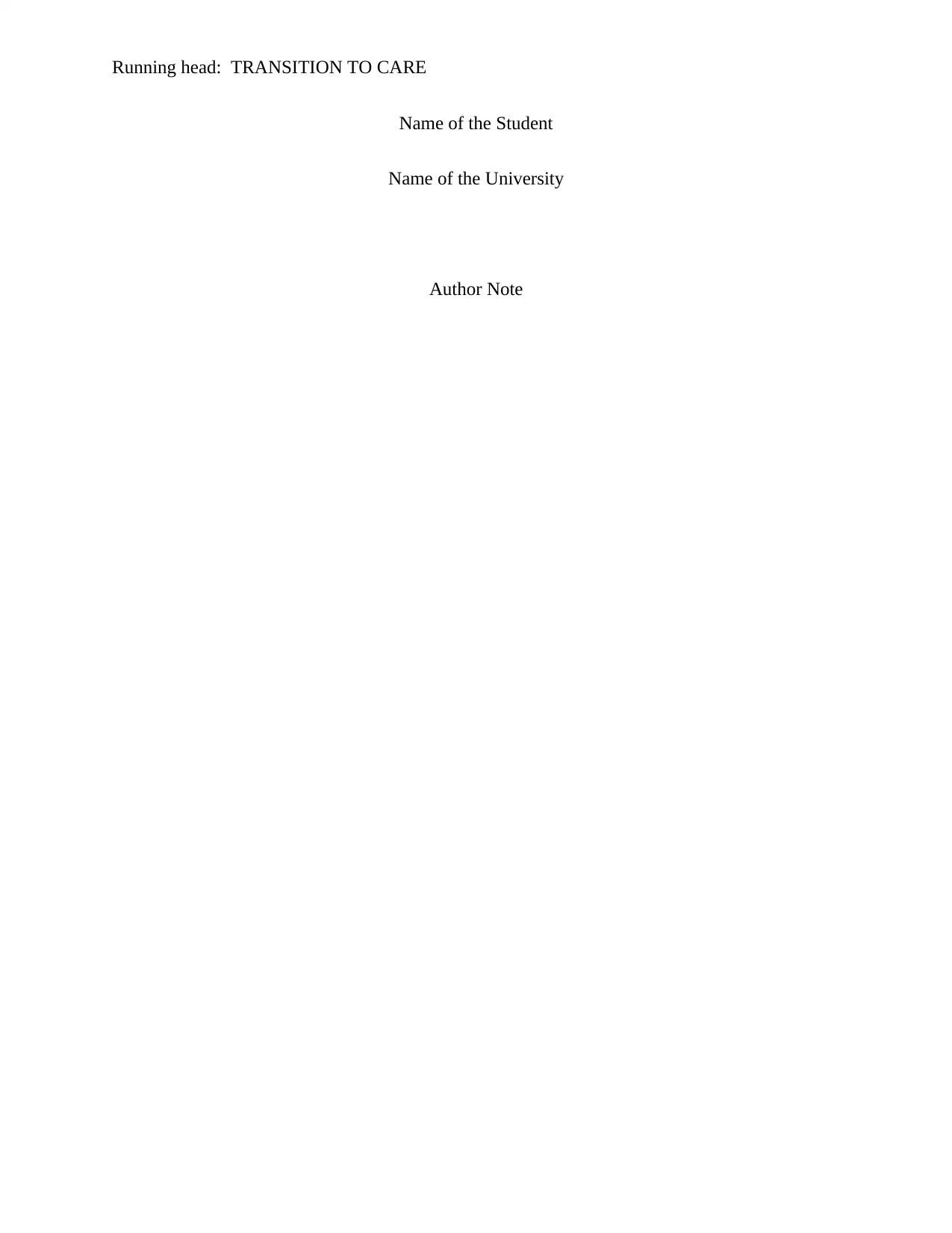
Running head: TRANSITION TO CARE
Name of the Student
Name of the University
Author Note
Name of the Student
Name of the University
Author Note
Paraphrase This Document
Need a fresh take? Get an instant paraphrase of this document with our AI Paraphraser
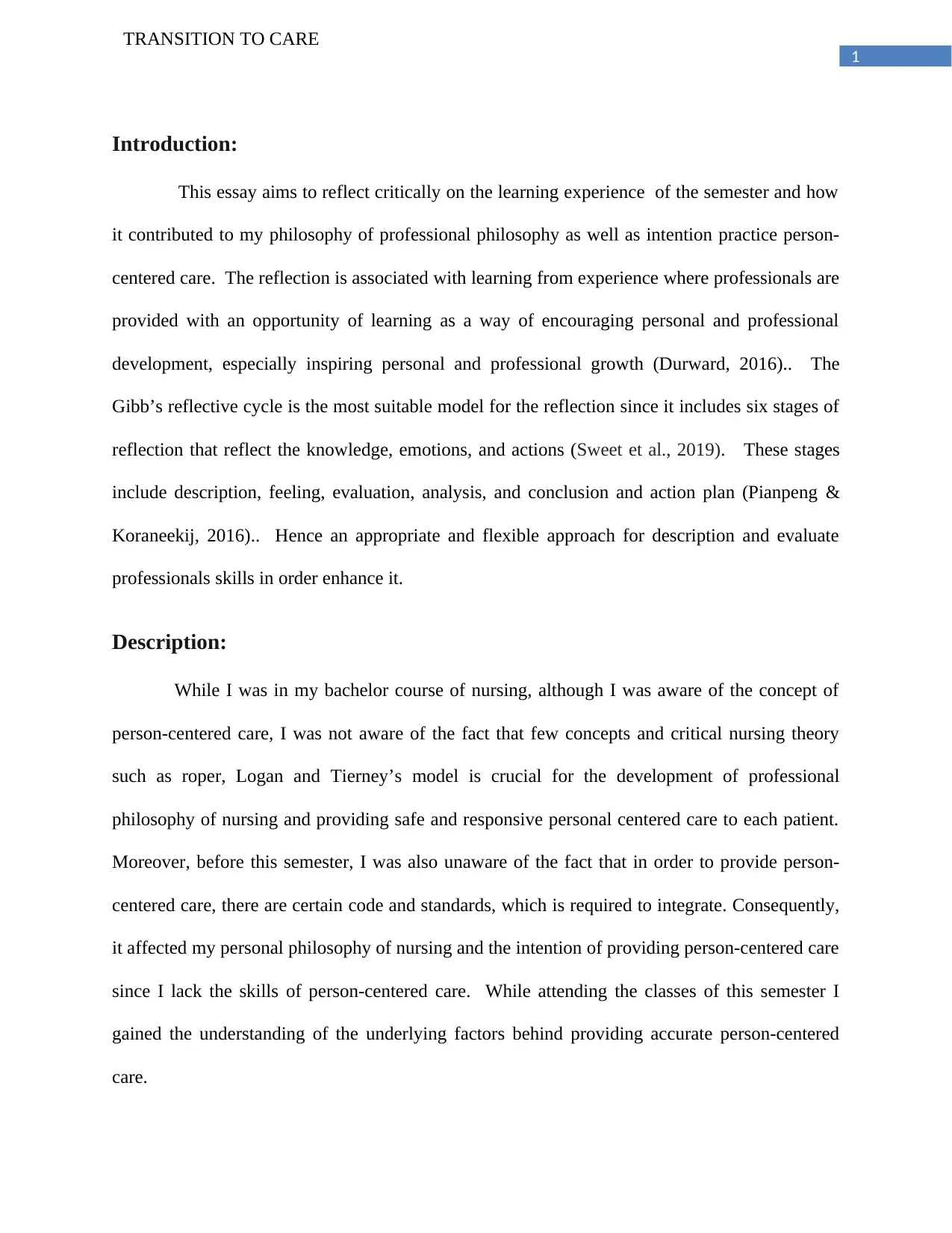
1
TRANSITION TO CARE
Introduction:
This essay aims to reflect critically on the learning experience of the semester and how
it contributed to my philosophy of professional philosophy as well as intention practice person-
centered care. The reflection is associated with learning from experience where professionals are
provided with an opportunity of learning as a way of encouraging personal and professional
development, especially inspiring personal and professional growth (Durward, 2016).. The
Gibb’s reflective cycle is the most suitable model for the reflection since it includes six stages of
reflection that reflect the knowledge, emotions, and actions (Sweet et al., 2019). These stages
include description, feeling, evaluation, analysis, and conclusion and action plan (Pianpeng &
Koraneekij, 2016).. Hence an appropriate and flexible approach for description and evaluate
professionals skills in order enhance it.
Description:
While I was in my bachelor course of nursing, although I was aware of the concept of
person-centered care, I was not aware of the fact that few concepts and critical nursing theory
such as roper, Logan and Tierney’s model is crucial for the development of professional
philosophy of nursing and providing safe and responsive personal centered care to each patient.
Moreover, before this semester, I was also unaware of the fact that in order to provide person-
centered care, there are certain code and standards, which is required to integrate. Consequently,
it affected my personal philosophy of nursing and the intention of providing person-centered care
since I lack the skills of person-centered care. While attending the classes of this semester I
gained the understanding of the underlying factors behind providing accurate person-centered
care.
TRANSITION TO CARE
Introduction:
This essay aims to reflect critically on the learning experience of the semester and how
it contributed to my philosophy of professional philosophy as well as intention practice person-
centered care. The reflection is associated with learning from experience where professionals are
provided with an opportunity of learning as a way of encouraging personal and professional
development, especially inspiring personal and professional growth (Durward, 2016).. The
Gibb’s reflective cycle is the most suitable model for the reflection since it includes six stages of
reflection that reflect the knowledge, emotions, and actions (Sweet et al., 2019). These stages
include description, feeling, evaluation, analysis, and conclusion and action plan (Pianpeng &
Koraneekij, 2016).. Hence an appropriate and flexible approach for description and evaluate
professionals skills in order enhance it.
Description:
While I was in my bachelor course of nursing, although I was aware of the concept of
person-centered care, I was not aware of the fact that few concepts and critical nursing theory
such as roper, Logan and Tierney’s model is crucial for the development of professional
philosophy of nursing and providing safe and responsive personal centered care to each patient.
Moreover, before this semester, I was also unaware of the fact that in order to provide person-
centered care, there are certain code and standards, which is required to integrate. Consequently,
it affected my personal philosophy of nursing and the intention of providing person-centered care
since I lack the skills of person-centered care. While attending the classes of this semester I
gained the understanding of the underlying factors behind providing accurate person-centered
care.
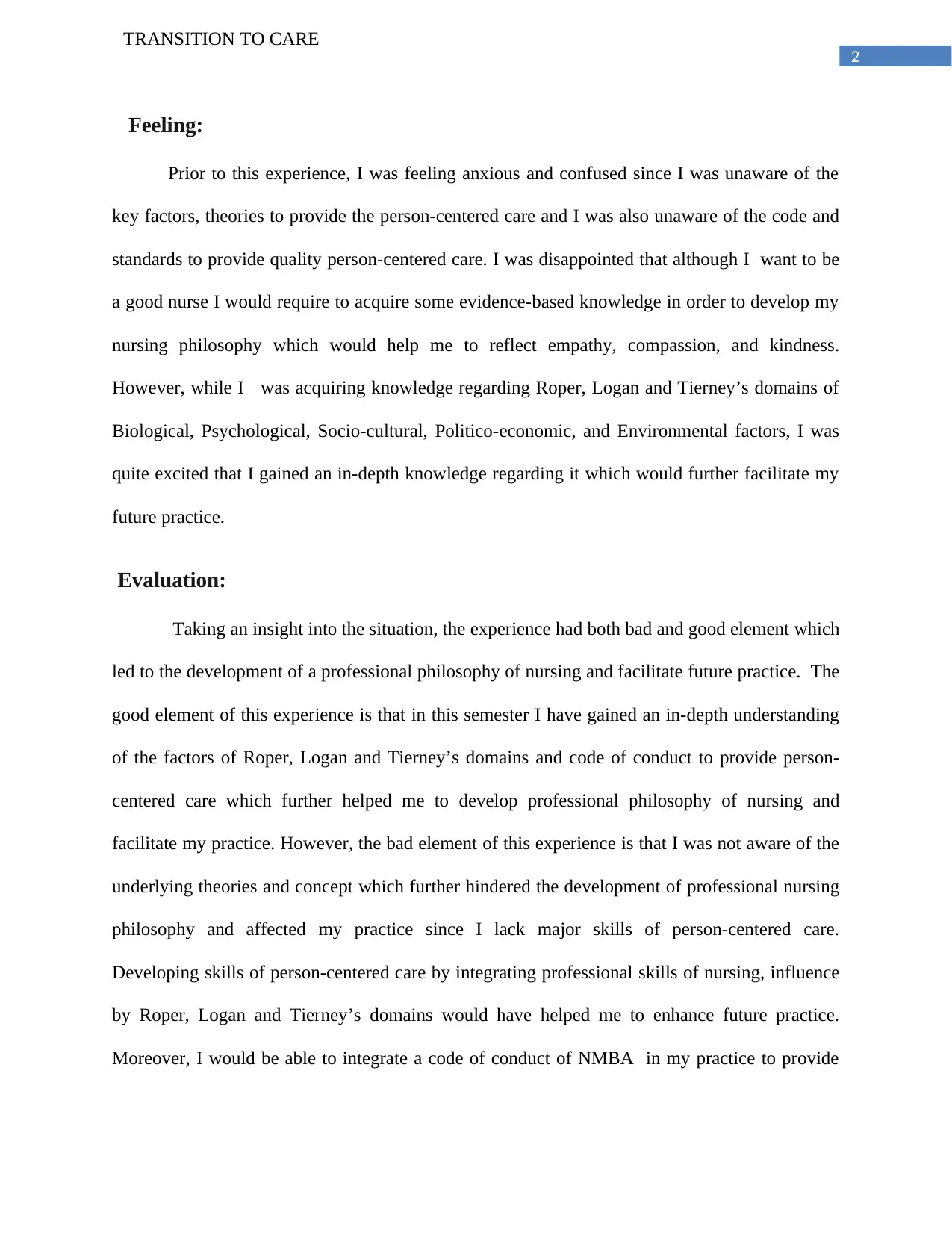
2
TRANSITION TO CARE
Feeling:
Prior to this experience, I was feeling anxious and confused since I was unaware of the
key factors, theories to provide the person-centered care and I was also unaware of the code and
standards to provide quality person-centered care. I was disappointed that although I want to be
a good nurse I would require to acquire some evidence-based knowledge in order to develop my
nursing philosophy which would help me to reflect empathy, compassion, and kindness.
However, while I was acquiring knowledge regarding Roper, Logan and Tierney’s domains of
Biological, Psychological, Socio-cultural, Politico-economic, and Environmental factors, I was
quite excited that I gained an in-depth knowledge regarding it which would further facilitate my
future practice.
Evaluation:
Taking an insight into the situation, the experience had both bad and good element which
led to the development of a professional philosophy of nursing and facilitate future practice. The
good element of this experience is that in this semester I have gained an in-depth understanding
of the factors of Roper, Logan and Tierney’s domains and code of conduct to provide person-
centered care which further helped me to develop professional philosophy of nursing and
facilitate my practice. However, the bad element of this experience is that I was not aware of the
underlying theories and concept which further hindered the development of professional nursing
philosophy and affected my practice since I lack major skills of person-centered care.
Developing skills of person-centered care by integrating professional skills of nursing, influence
by Roper, Logan and Tierney’s domains would have helped me to enhance future practice.
Moreover, I would be able to integrate a code of conduct of NMBA in my practice to provide
TRANSITION TO CARE
Feeling:
Prior to this experience, I was feeling anxious and confused since I was unaware of the
key factors, theories to provide the person-centered care and I was also unaware of the code and
standards to provide quality person-centered care. I was disappointed that although I want to be
a good nurse I would require to acquire some evidence-based knowledge in order to develop my
nursing philosophy which would help me to reflect empathy, compassion, and kindness.
However, while I was acquiring knowledge regarding Roper, Logan and Tierney’s domains of
Biological, Psychological, Socio-cultural, Politico-economic, and Environmental factors, I was
quite excited that I gained an in-depth knowledge regarding it which would further facilitate my
future practice.
Evaluation:
Taking an insight into the situation, the experience had both bad and good element which
led to the development of a professional philosophy of nursing and facilitate future practice. The
good element of this experience is that in this semester I have gained an in-depth understanding
of the factors of Roper, Logan and Tierney’s domains and code of conduct to provide person-
centered care which further helped me to develop professional philosophy of nursing and
facilitate my practice. However, the bad element of this experience is that I was not aware of the
underlying theories and concept which further hindered the development of professional nursing
philosophy and affected my practice since I lack major skills of person-centered care.
Developing skills of person-centered care by integrating professional skills of nursing, influence
by Roper, Logan and Tierney’s domains would have helped me to enhance future practice.
Moreover, I would be able to integrate a code of conduct of NMBA in my practice to provide
⊘ This is a preview!⊘
Do you want full access?
Subscribe today to unlock all pages.

Trusted by 1+ million students worldwide
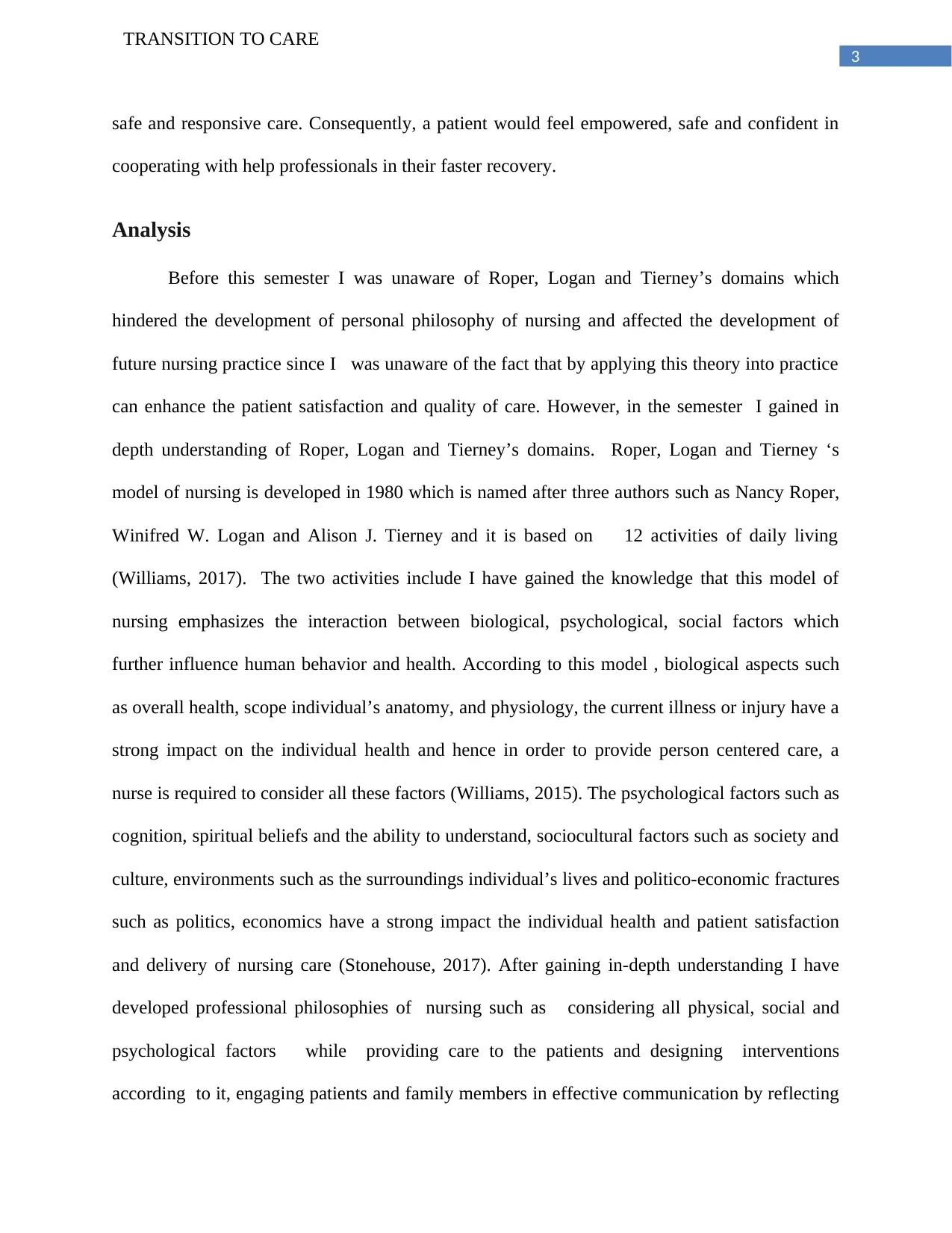
3
TRANSITION TO CARE
safe and responsive care. Consequently, a patient would feel empowered, safe and confident in
cooperating with help professionals in their faster recovery.
Analysis
Before this semester I was unaware of Roper, Logan and Tierney’s domains which
hindered the development of personal philosophy of nursing and affected the development of
future nursing practice since I was unaware of the fact that by applying this theory into practice
can enhance the patient satisfaction and quality of care. However, in the semester I gained in
depth understanding of Roper, Logan and Tierney’s domains. Roper, Logan and Tierney ‘s
model of nursing is developed in 1980 which is named after three authors such as Nancy Roper,
Winifred W. Logan and Alison J. Tierney and it is based on 12 activities of daily living
(Williams, 2017). The two activities include I have gained the knowledge that this model of
nursing emphasizes the interaction between biological, psychological, social factors which
further influence human behavior and health. According to this model , biological aspects such
as overall health, scope individual’s anatomy, and physiology, the current illness or injury have a
strong impact on the individual health and hence in order to provide person centered care, a
nurse is required to consider all these factors (Williams, 2015). The psychological factors such as
cognition, spiritual beliefs and the ability to understand, sociocultural factors such as society and
culture, environments such as the surroundings individual’s lives and politico-economic fractures
such as politics, economics have a strong impact the individual health and patient satisfaction
and delivery of nursing care (Stonehouse, 2017). After gaining in-depth understanding I have
developed professional philosophies of nursing such as considering all physical, social and
psychological factors while providing care to the patients and designing interventions
according to it, engaging patients and family members in effective communication by reflecting
TRANSITION TO CARE
safe and responsive care. Consequently, a patient would feel empowered, safe and confident in
cooperating with help professionals in their faster recovery.
Analysis
Before this semester I was unaware of Roper, Logan and Tierney’s domains which
hindered the development of personal philosophy of nursing and affected the development of
future nursing practice since I was unaware of the fact that by applying this theory into practice
can enhance the patient satisfaction and quality of care. However, in the semester I gained in
depth understanding of Roper, Logan and Tierney’s domains. Roper, Logan and Tierney ‘s
model of nursing is developed in 1980 which is named after three authors such as Nancy Roper,
Winifred W. Logan and Alison J. Tierney and it is based on 12 activities of daily living
(Williams, 2017). The two activities include I have gained the knowledge that this model of
nursing emphasizes the interaction between biological, psychological, social factors which
further influence human behavior and health. According to this model , biological aspects such
as overall health, scope individual’s anatomy, and physiology, the current illness or injury have a
strong impact on the individual health and hence in order to provide person centered care, a
nurse is required to consider all these factors (Williams, 2015). The psychological factors such as
cognition, spiritual beliefs and the ability to understand, sociocultural factors such as society and
culture, environments such as the surroundings individual’s lives and politico-economic fractures
such as politics, economics have a strong impact the individual health and patient satisfaction
and delivery of nursing care (Stonehouse, 2017). After gaining in-depth understanding I have
developed professional philosophies of nursing such as considering all physical, social and
psychological factors while providing care to the patients and designing interventions
according to it, engaging patients and family members in effective communication by reflecting
Paraphrase This Document
Need a fresh take? Get an instant paraphrase of this document with our AI Paraphraser
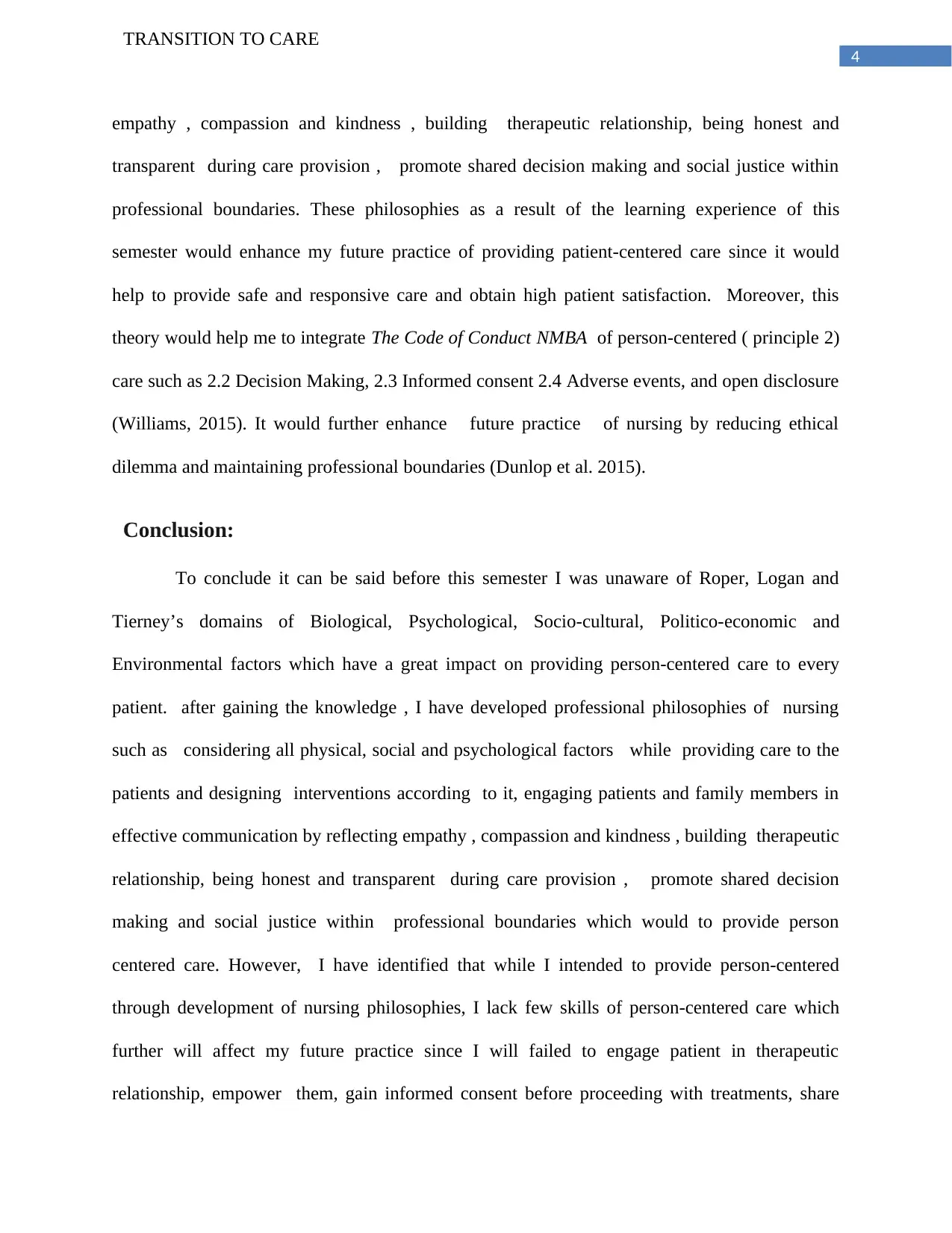
4
TRANSITION TO CARE
empathy , compassion and kindness , building therapeutic relationship, being honest and
transparent during care provision , promote shared decision making and social justice within
professional boundaries. These philosophies as a result of the learning experience of this
semester would enhance my future practice of providing patient-centered care since it would
help to provide safe and responsive care and obtain high patient satisfaction. Moreover, this
theory would help me to integrate The Code of Conduct NMBA of person-centered ( principle 2)
care such as 2.2 Decision Making, 2.3 Informed consent 2.4 Adverse events, and open disclosure
(Williams, 2015). It would further enhance future practice of nursing by reducing ethical
dilemma and maintaining professional boundaries (Dunlop et al. 2015).
Conclusion:
To conclude it can be said before this semester I was unaware of Roper, Logan and
Tierney’s domains of Biological, Psychological, Socio-cultural, Politico-economic and
Environmental factors which have a great impact on providing person-centered care to every
patient. after gaining the knowledge , I have developed professional philosophies of nursing
such as considering all physical, social and psychological factors while providing care to the
patients and designing interventions according to it, engaging patients and family members in
effective communication by reflecting empathy , compassion and kindness , building therapeutic
relationship, being honest and transparent during care provision , promote shared decision
making and social justice within professional boundaries which would to provide person
centered care. However, I have identified that while I intended to provide person-centered
through development of nursing philosophies, I lack few skills of person-centered care which
further will affect my future practice since I will failed to engage patient in therapeutic
relationship, empower them, gain informed consent before proceeding with treatments, share
TRANSITION TO CARE
empathy , compassion and kindness , building therapeutic relationship, being honest and
transparent during care provision , promote shared decision making and social justice within
professional boundaries. These philosophies as a result of the learning experience of this
semester would enhance my future practice of providing patient-centered care since it would
help to provide safe and responsive care and obtain high patient satisfaction. Moreover, this
theory would help me to integrate The Code of Conduct NMBA of person-centered ( principle 2)
care such as 2.2 Decision Making, 2.3 Informed consent 2.4 Adverse events, and open disclosure
(Williams, 2015). It would further enhance future practice of nursing by reducing ethical
dilemma and maintaining professional boundaries (Dunlop et al. 2015).
Conclusion:
To conclude it can be said before this semester I was unaware of Roper, Logan and
Tierney’s domains of Biological, Psychological, Socio-cultural, Politico-economic and
Environmental factors which have a great impact on providing person-centered care to every
patient. after gaining the knowledge , I have developed professional philosophies of nursing
such as considering all physical, social and psychological factors while providing care to the
patients and designing interventions according to it, engaging patients and family members in
effective communication by reflecting empathy , compassion and kindness , building therapeutic
relationship, being honest and transparent during care provision , promote shared decision
making and social justice within professional boundaries which would to provide person
centered care. However, I have identified that while I intended to provide person-centered
through development of nursing philosophies, I lack few skills of person-centered care which
further will affect my future practice since I will failed to engage patient in therapeutic
relationship, empower them, gain informed consent before proceeding with treatments, share
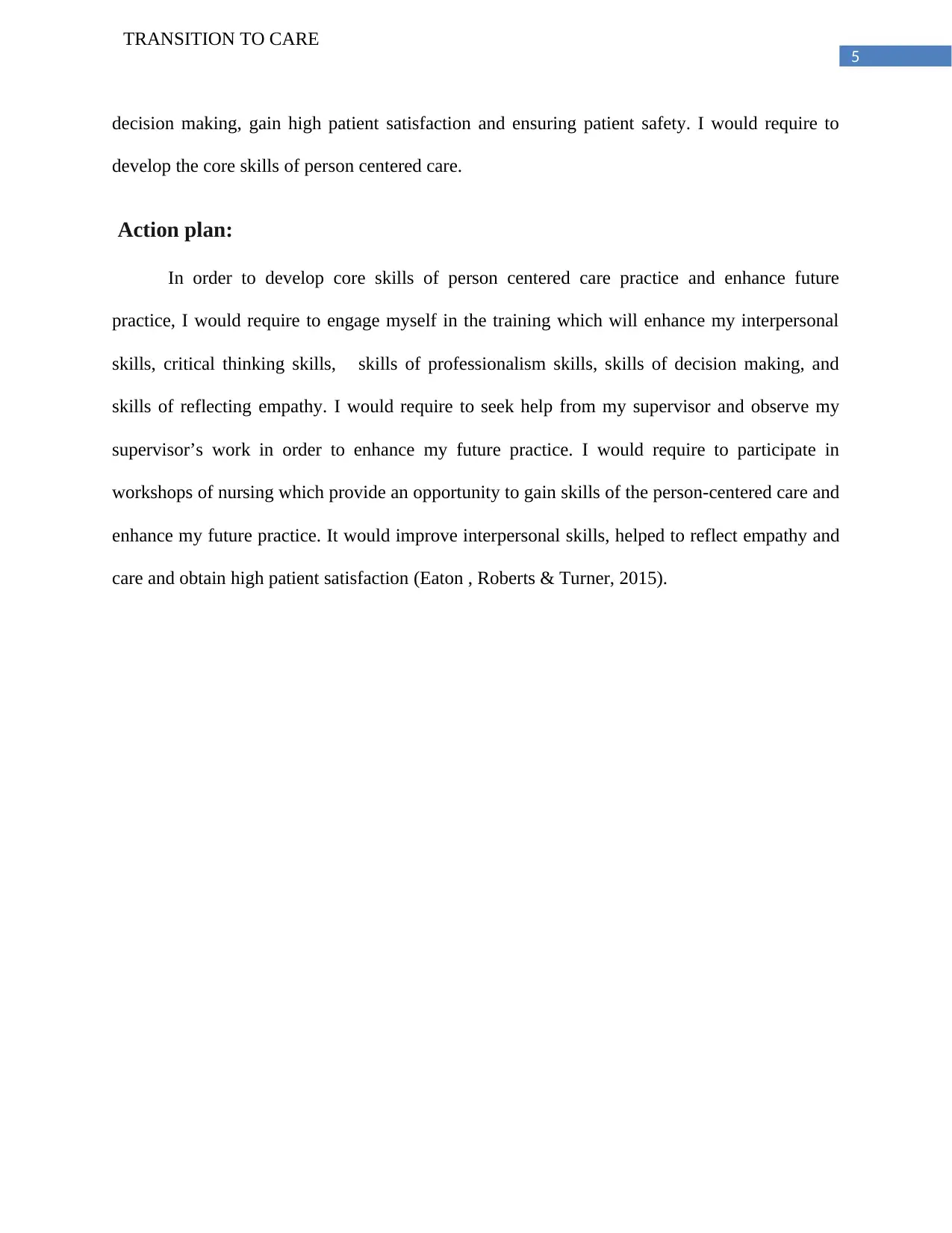
5
TRANSITION TO CARE
decision making, gain high patient satisfaction and ensuring patient safety. I would require to
develop the core skills of person centered care.
Action plan:
In order to develop core skills of person centered care practice and enhance future
practice, I would require to engage myself in the training which will enhance my interpersonal
skills, critical thinking skills, skills of professionalism skills, skills of decision making, and
skills of reflecting empathy. I would require to seek help from my supervisor and observe my
supervisor’s work in order to enhance my future practice. I would require to participate in
workshops of nursing which provide an opportunity to gain skills of the person-centered care and
enhance my future practice. It would improve interpersonal skills, helped to reflect empathy and
care and obtain high patient satisfaction (Eaton , Roberts & Turner, 2015).
TRANSITION TO CARE
decision making, gain high patient satisfaction and ensuring patient safety. I would require to
develop the core skills of person centered care.
Action plan:
In order to develop core skills of person centered care practice and enhance future
practice, I would require to engage myself in the training which will enhance my interpersonal
skills, critical thinking skills, skills of professionalism skills, skills of decision making, and
skills of reflecting empathy. I would require to seek help from my supervisor and observe my
supervisor’s work in order to enhance my future practice. I would require to participate in
workshops of nursing which provide an opportunity to gain skills of the person-centered care and
enhance my future practice. It would improve interpersonal skills, helped to reflect empathy and
care and obtain high patient satisfaction (Eaton , Roberts & Turner, 2015).
⊘ This is a preview!⊘
Do you want full access?
Subscribe today to unlock all pages.

Trusted by 1+ million students worldwide
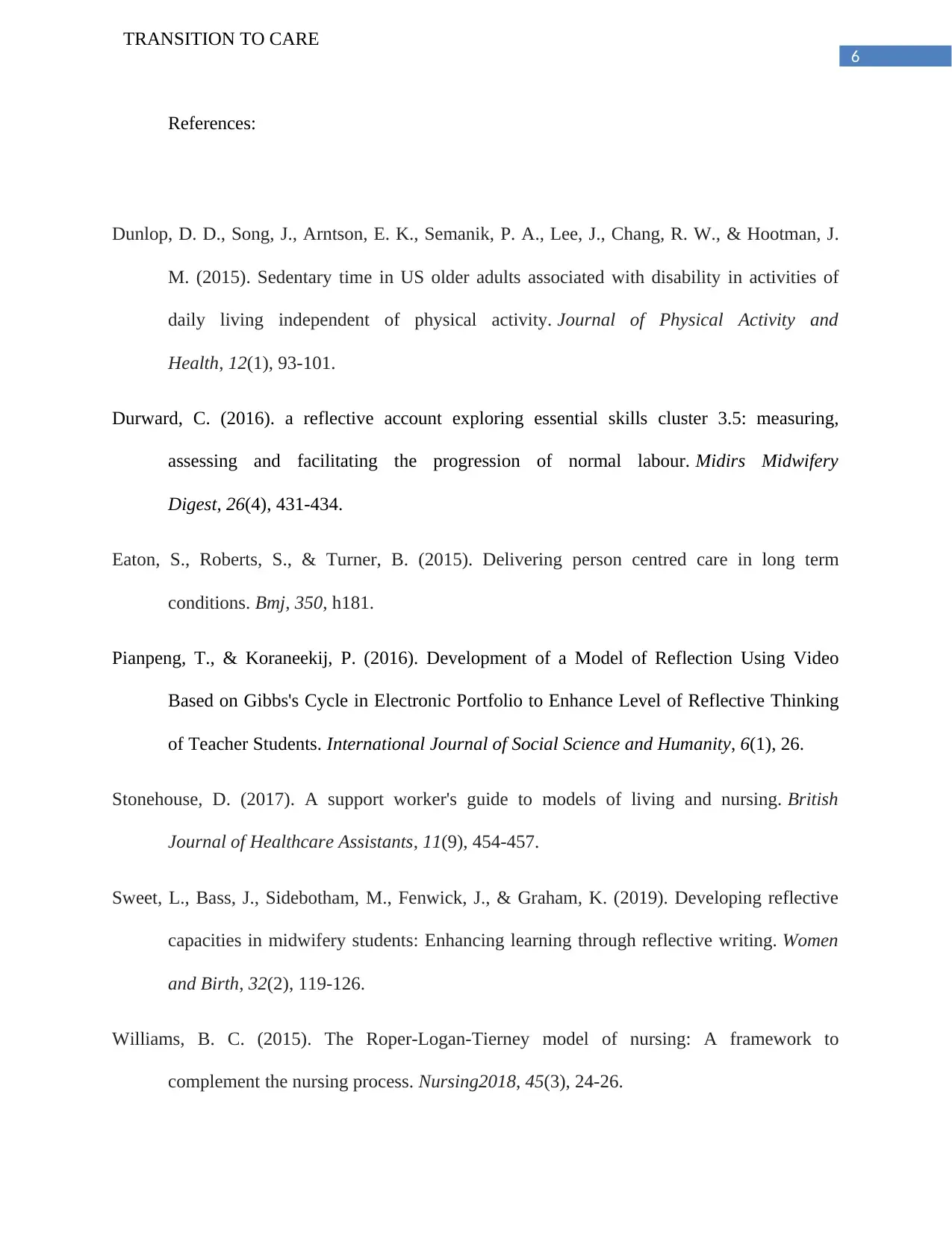
6
TRANSITION TO CARE
References:
Dunlop, D. D., Song, J., Arntson, E. K., Semanik, P. A., Lee, J., Chang, R. W., & Hootman, J.
M. (2015). Sedentary time in US older adults associated with disability in activities of
daily living independent of physical activity. Journal of Physical Activity and
Health, 12(1), 93-101.
Durward, C. (2016). a reflective account exploring essential skills cluster 3.5: measuring,
assessing and facilitating the progression of normal labour. Midirs Midwifery
Digest, 26(4), 431-434.
Eaton, S., Roberts, S., & Turner, B. (2015). Delivering person centred care in long term
conditions. Bmj, 350, h181.
Pianpeng, T., & Koraneekij, P. (2016). Development of a Model of Reflection Using Video
Based on Gibbs's Cycle in Electronic Portfolio to Enhance Level of Reflective Thinking
of Teacher Students. International Journal of Social Science and Humanity, 6(1), 26.
Stonehouse, D. (2017). A support worker's guide to models of living and nursing. British
Journal of Healthcare Assistants, 11(9), 454-457.
Sweet, L., Bass, J., Sidebotham, M., Fenwick, J., & Graham, K. (2019). Developing reflective
capacities in midwifery students: Enhancing learning through reflective writing. Women
and Birth, 32(2), 119-126.
Williams, B. C. (2015). The Roper-Logan-Tierney model of nursing: A framework to
complement the nursing process. Nursing2018, 45(3), 24-26.
TRANSITION TO CARE
References:
Dunlop, D. D., Song, J., Arntson, E. K., Semanik, P. A., Lee, J., Chang, R. W., & Hootman, J.
M. (2015). Sedentary time in US older adults associated with disability in activities of
daily living independent of physical activity. Journal of Physical Activity and
Health, 12(1), 93-101.
Durward, C. (2016). a reflective account exploring essential skills cluster 3.5: measuring,
assessing and facilitating the progression of normal labour. Midirs Midwifery
Digest, 26(4), 431-434.
Eaton, S., Roberts, S., & Turner, B. (2015). Delivering person centred care in long term
conditions. Bmj, 350, h181.
Pianpeng, T., & Koraneekij, P. (2016). Development of a Model of Reflection Using Video
Based on Gibbs's Cycle in Electronic Portfolio to Enhance Level of Reflective Thinking
of Teacher Students. International Journal of Social Science and Humanity, 6(1), 26.
Stonehouse, D. (2017). A support worker's guide to models of living and nursing. British
Journal of Healthcare Assistants, 11(9), 454-457.
Sweet, L., Bass, J., Sidebotham, M., Fenwick, J., & Graham, K. (2019). Developing reflective
capacities in midwifery students: Enhancing learning through reflective writing. Women
and Birth, 32(2), 119-126.
Williams, B. C. (2015). The Roper-Logan-Tierney model of nursing: A framework to
complement the nursing process. Nursing2018, 45(3), 24-26.
Paraphrase This Document
Need a fresh take? Get an instant paraphrase of this document with our AI Paraphraser
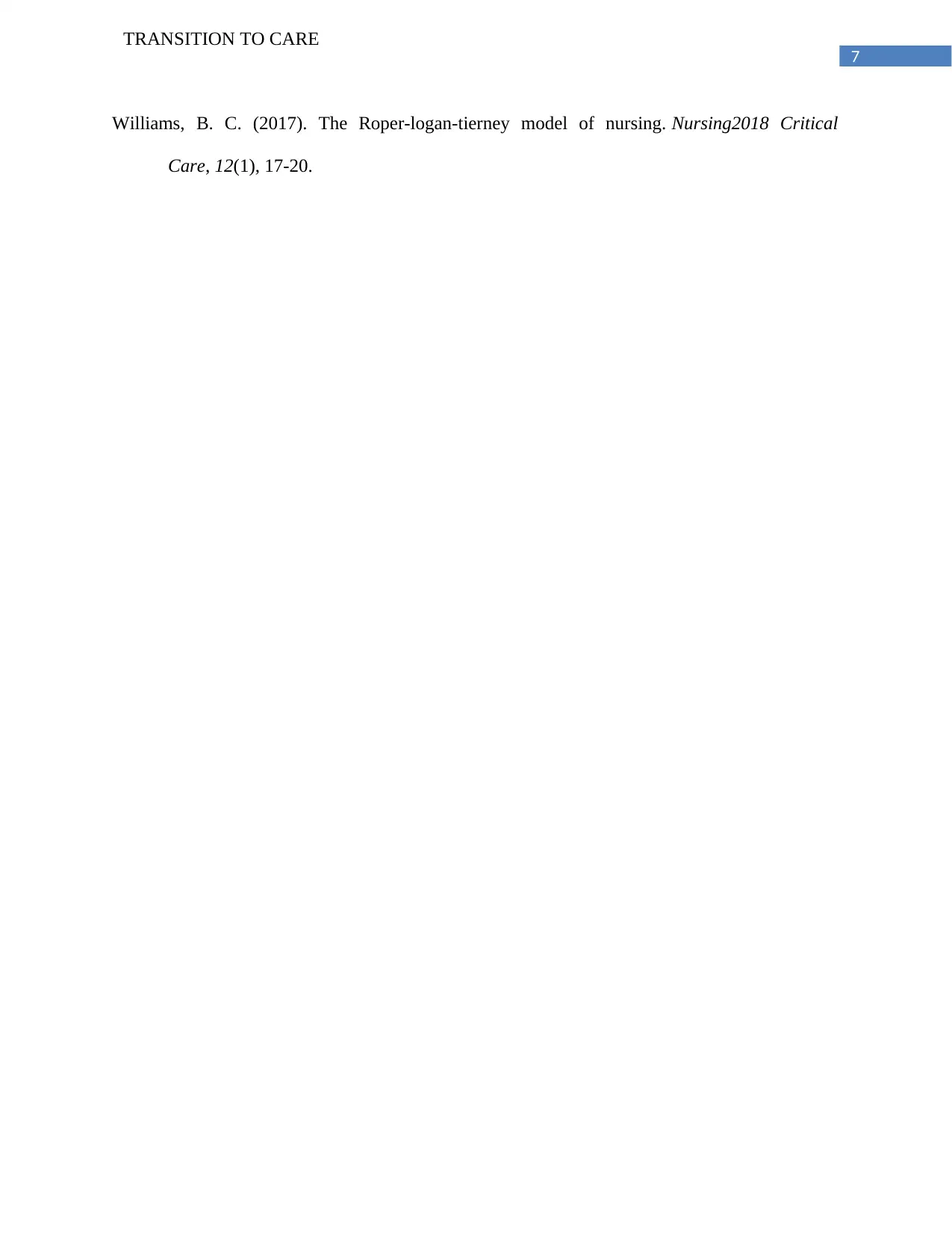
7
TRANSITION TO CARE
Williams, B. C. (2017). The Roper-logan-tierney model of nursing. Nursing2018 Critical
Care, 12(1), 17-20.
TRANSITION TO CARE
Williams, B. C. (2017). The Roper-logan-tierney model of nursing. Nursing2018 Critical
Care, 12(1), 17-20.
1 out of 8
Related Documents
Your All-in-One AI-Powered Toolkit for Academic Success.
+13062052269
info@desklib.com
Available 24*7 on WhatsApp / Email
![[object Object]](/_next/static/media/star-bottom.7253800d.svg)
Unlock your academic potential
Copyright © 2020–2026 A2Z Services. All Rights Reserved. Developed and managed by ZUCOL.




